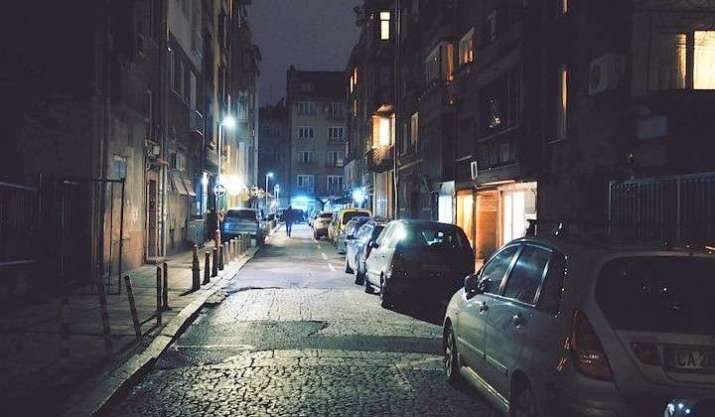
Welcome to another Living Metta experiment, taking metta off the meditation cushion and out into the world. This month looks at what happened when I literally gave metta legs.
Last autumn, work found me helping on a parking survey. Rather than survey public transport passengers (as described in March’s article When Metta’s Just the Ticket), the job was to record parked vehicles in and around the city centre of Liverpool.
About 30 of us assembled for the project instructions and were handed an inch paperwork of our “beats” for the following day. This included maps of a section of the city to canvas and data sheets to note licence plates and type of parking (legal, illegal, expired) every two hours, four times to help the city council identify weekday and weekend parking patterns.

The first day, I was in position at 6am just near The Cavern Club (considered the performance birthplace of The Beatles) to start my walking beat. It was a wet and wild morning and the only other living souls around were street cleaners, rough sleepers, and drunken partygoers still out partying. I found it unexpectedly fascinating to walk the exact same route every two hours as the city slowly woke up. One round I was dodging rush hour commuters and the next round I was giving tourists and out-of-town bargain hunters directions.
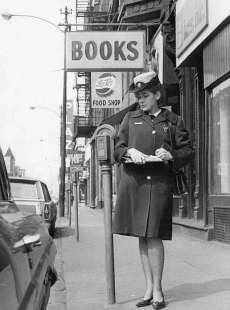
Wearing a high-visibility vest, carrying a clipboard, and noting down licence plates sent projections from the general public into overdrive. While the famous Beatles song Lovely Rita about courting a meter maid was going around my head all day, most passersby assumed that I was issuing parking tickets or supporting France’s Yellow Vest movement and—rather than inviting me to tea, as the song goes—either cursed me or cheered me on.
More often than not they’d often launch into a monologue of excuses and I’d patiently hear them out (trying not to laugh, depending on how outrageous they became—one woman showed me a photo of her dog actually eating her previous parking ticket!) until there was enough of a gap to respond: “I don’t have that kind of authority over you. I’m not trying to catch anyone out. I’m just here to record patterns for future planning.” I’d then show them the data sheets in the spirit of transparency and they would visibly exhale. Rather than judge, if anything, I admired the creativity of illegal parking and the crazy notes left on dashboards I witnessed during the project.
Reporting back at the supervisor’s van, I discovered that some of my co-workers hated their first day, felt overwhelmed by the paperwork, were annoyed at the weather and all the walking required, had engaged in shouting matches with the public, and some had even walked off the job already! It was then that I realized how my meditation practice had prepared me well, without realizing it, for dealing with public projections and for taking a mindful approach to the repetitive work.
Most religious and spiritual traditions have their equivalent, whether pilgrimages to specific outer sites or walking labyrinths to inner states. Perhaps you’ve tried some form of walking meditation at some point as a mindfulness practice?
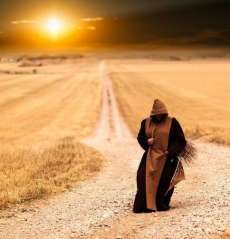
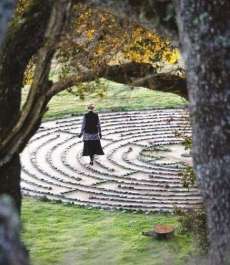
My personal walking meditation role model is Peace Pilgrim, an American woman who started walking on 1 January 1953 to protest the Korean War vowing to remain a wanderer until mankind has learned the way of peace, walking until given shelter and fasting until given food. She kept going for some 25,000 miles until her death in 1981, carrying only a comb, a toothbrush, and any letters that needed answering in her tunic.
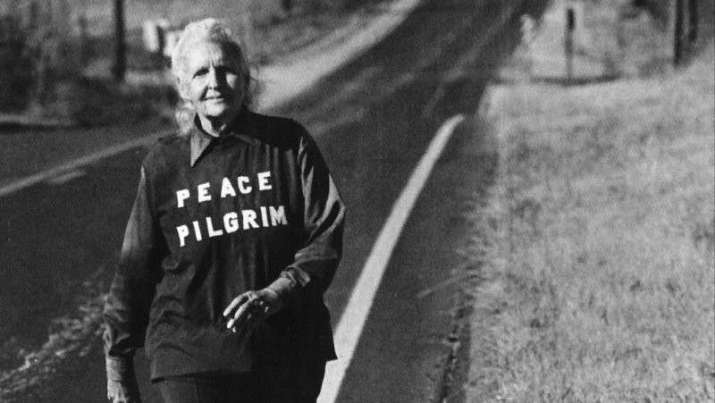
While we certainly didn’t end up walking 25,000 miles for parking purposes (although some days it came close to feeling like we had), the project stretched out from three weeks to six months (and six different supervisors!) because no one but me was enjoying it. My secret? I opted to become Parking Pilgrim and generate metta for all whom I encountered.
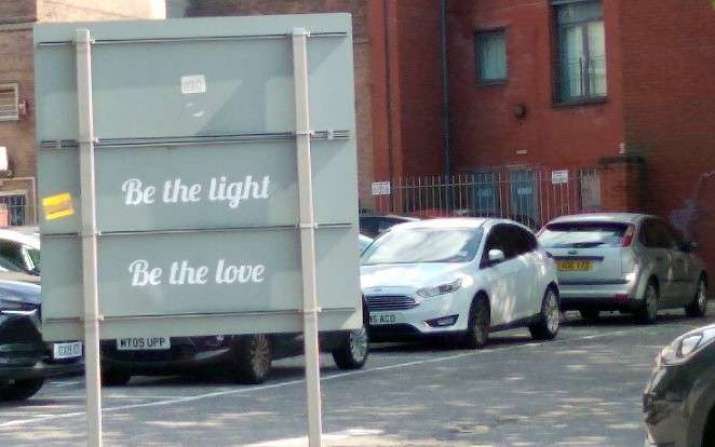
None of what I’m about to recount is meant to imply meditators are superior to those who don’t meditate, but simply to demonstrate how applying a metta mindset transformed the seemingly boring task of literally going in circles.
Depending on the complexity of my route and the weather conditions, not every round took two hours, so finding shelter to fill the time became paramount. If I was lucky, there was a 24-hour restaurant nearby for a hot drink and a toilet break. Whatever readers may think of the big fast-food chains, my appreciation for them skyrocketed after witnessing many thankless acts of kindness toward customers from staff working the graveyard shift. There are secret saints—“burger-sattvas”—working cash registers and facing all sorts of abuse while most of us sleep.
The project stretching out for months also meant getting to know little pockets of the city really well, discovering independent shops, cafes, or streets I would never otherwise have known existed. I even stumbled upon an underground parking garage that donated its fees to charity.
One of the most striking examples of choosing to become Parking Pilgrim was a woman coming out of a restaurant-under-construction to shout at me and the world at large that a ticket was the last thing she needed right now. I gave her my usual explanation, silently blessing her, but she still didn’t look convinced. The following round, she was surprised to see me again and softened some. By the final round, I’d learned that she was outfitting her first restaurant, due to open later that week, and was having trouble moving the industrial-sized fridge into the kitchen. When I offered to help, I went from evil traffic warden to day-glo delivery person in a short six hours. I’m happy to report, six months on, that the restaurant is doing well and the wall stretch marks of that day’s difficult birth are no longer visible.
Surveying such unusual hours also meant witnessing firsthand just how many people are sleeping rough. I silently generated metta for them and offered what I had to hand, whether change or food or a kind word. Passing by every two hours put me on friendly terms with most, and they often thanked me more for the friendly conversation more than the donations. It saddened me to overhear co-workers complain or make fun of these souls when the ones I was speaking with struck me as hugely brave. One rough sleeper in particular stands out in hindsight. I was recording a car parked illegally on a dropped curb, when a man huddled in a sleeping bag in a doorway called out to me to please not give the driver a ticket as they had specifically stopped to pop into a nearby shop to buy him some food.
In complete contrast, I was recording the licence plate of a very luxurious car when a deep voice behind me asked: “What do you think you’re doing?” Surprised, as I thought I was alone, I turned to give my usual explanation only to find myself staring into the chest of a man twice my size, dressed head to toe in black, and wearing sunglasses on an overcast day. He curtly cut me off to say that this was the mayor’s car and I had best keep moving. I smiled, gave him my supervisor’s telephone number, and replied: “Well, it’s a good thing for us both that the mayor’s parked legally considering his office commissioned this survey.”
As I walked away, I remembered Kiran Bedi famously giving Indira Gandhi a parking ticket in 1982 to demonstrate to the world that no one—including the prime minister—was above the law. Bedi went on to introduce Vipassana meditation at India’s biggest prison in Tihar and later the Delhi police academy.
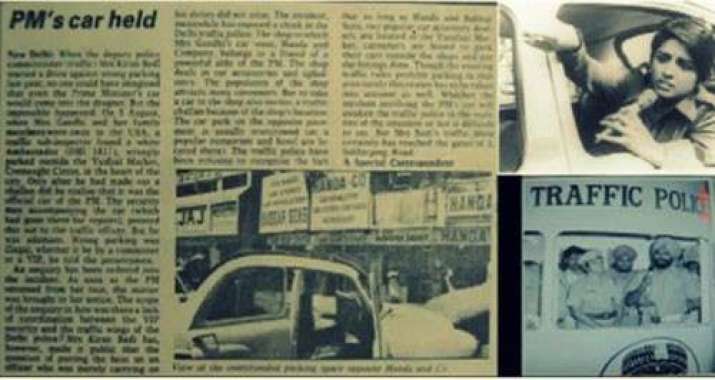
On another stretch of that same round, each time I passed, I noticed a man streaming films on his tablet while in his car, which was illegally parked in a loading bay. On my final round, he noticed me for the first time and lowered the window to ask what I was doing. He claimed that he was a policeman on a stakeout and was concerned I might give away his cover. I gave him my usual explanation and couldn’t resist teasing him about whether James Bond films were now considered police training videos and noting that even 007 wasn’t above traffic laws.

Every once in a while, a beat was considered too dangerous to walk solo and so my Parking Pilgrim cover was revealed. A co-worker and I were canvassing a residential neighbourhood that was being overburdened by medical staff and visitors from a nearby hospital who were looking for free parking.
It had reached the point that—ironically—we found private drives were being blocked, a wheelchair user was trapped in his house because of a car parked on the pavement outside his front door, and the roads were so clogged no emergency vehicle could ever get down them. As we passed, people came out of their houses to shout their opinions about the situation. I let them get it all off their chests, gently explained our purpose, and they would often go back inside their houses only to fetch us bottled water and snacks.
Taking shelter in the hospital’s waiting area between rounds, my co-worker asked me, “What are you doing to people? I normally just tell them I’m doing a survey and keep walking. You? You’re melting them.” I took a risk by explaining that most of the people giving us abuse were not really angry at parking and described the basic premise of generating metta. It turned out that his wife was a Buddhist and he understood more than I expected. From then on, when co-workers moaned about the project at the supervisor’s van, we’d give each other knowing smiles.
My final beat found me outside a well known Liverpool church on a Sunday afternoon. The vicar rushed out, swearing a blind streak, demanding to know what I was doing and ranting about motorists taking the spaces of actual parishioners and then accusing him of being un-Christian for not letting them park there for free. I heard him out, secretly amazed that perhaps none of us are immune to parking sankharas, and added a suggestion to my usual explanation. “Have you considered going Old Testament on the trespassers?” He looked baffled. “Perhaps rig something up that could smite them with lightning bolts instead of tickets?” He laughed heartily at the idea and invited me to tea before my last round. At the eleventh hour, this Metta Maid was finally invited to tea . . . and discovered that Mother Cabrini, the Catholic patron saint of immigrants, is also, unofficially, the saint of parking!
The project ended in March, but I still find myself silently blessing any illegally parked vehicles I pass (with an emphasis on “may you be free”) and asking Mother Cabrini to look after whatever else may be troubling them.
I remember reading many years ago about someone who decided to change their life by finding a new route to work every day for a year. As the months wore on, their commute became more and more hilarious and improbable. It may have been easier, though less entertaining, to follow French writer Marcel Proust’s famous beginners’ mind advice:
The real voyage of discovery consists not in seeking new landscapes, but in having new eyes.
So, my fellow would-be metta scientists, I challenge you this month to experiment giving metta legs to metta-morphose any area of your life in which you feel like you’re going in circles.

See more














